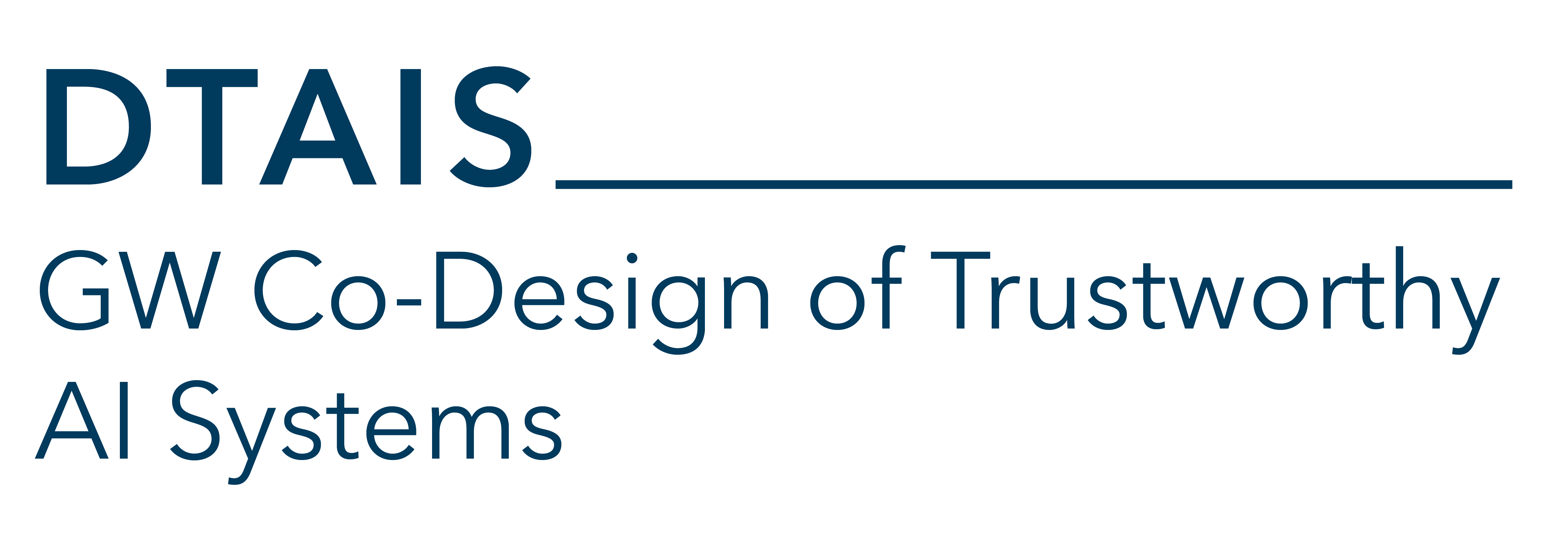PhD Fellowship
To what extent should we trust computer-generated recommendations? Should machine learning tools augment or replace human decision makers Will AI adoption improve or degrade quality of life for our workers? As artificial intelligence becomes increasingly embedded in every level of our work systems, GW’s Co-Design of Trustworthy AI Systems (DTAIS) program aims to foster the next generation of researchers grappling with complex questions such as these.
The DTAIS program offers a full-time PhD fellowship that prepares students to conduct interdisciplinary research at the intersection of artificial intelligence and human work systems. DTAIS students will develop essential research skills by completing the program components and producing an original dissertation on a topic aligned with the space. Students are admitted to the PhD in either Computer Science or Systems Engineering. As part of their program, they will complete a shared curriculum of interdisciplinary coursework in machine learning, human systems design and convergent research formulation. Through our intensive summer research incubator and weekly seminar, they will distill testable research questions from observed real-world problems, practice conveying complex ideas across disciplines and to general audiences, and learn to consider ethics, policy and trust at every step in the research process. Most importantly, they’ll spend their time at GW surrounded by a community of peers, faculty and industry mentors passionate about the research space and committed to fostering disciplinary exchange.
DTAIS is an NSF Research Traineeship (NRT) made possible by generous funding from the National Science Foundation (NSF). The NRT is one of the most prestigious ways that the NSF funds student researchers. Each year, a handful of fellows will be admitted as “funded fellows'' whose second year funding will be supported by the NSF. During this time, funded fellows are free to pursue their studies without the research obligations of a traditional PhD program. Due to federal policy, only US persons (citizens, naturalized or green card holders) are eligible to be admitted as funded fellows. International students are encouraged to apply and can be accepted as “other-funded fellows,” who have the same requirements and otherwise enjoy the same benefits as funded fellows. Other-funded fellows will meet their tuition obligation with a traditional PhD funding package in coordination with their advisor (including research assistantships, teaching assistantships, etc.).
Who Our Students Are
- Our students are passionate about research and committed to pursuing it full time.
- Our students prize collaboration and seek a community where ideas are freely exchanged and the perspectives of diverse stakeholders are valued.
- Our students' interests don’t fit cleanly into traditional disciplinary boundaries. They’re eager to tackle problems and explore topics outside of their comfort zones.
- Our students value mentorship and seek opportunities to act as mentors to their peers.
- Most students will enter with an MS in a relevant STEM discipline. Students who hold a BS can also be considered provided they demonstrate the potential for success at the PhD level.
- Both US nationals and international students are encouraged to apply.
What Our Students Receive
- An interdisciplinary education that will prepare them to produce groundbreaking work in this emerging field.
- Increased access to faculty in their home department and throughout GW.
- A supportive community of like-minded peers and faculty dedicated to interdisciplinary research.
- Instruction in research formulation and direct access to industry experts through our intensive summer boot camp.
- Training in complementary skills, including data visualization, public speaking and presentation, leadership, and mentoring.
- Access to peer, faculty, and industry mentors through our comprehensive mentorship program.
- Competitive funding packages and assistantship opportunities.
Required Coursework
- DTAIS fellows are required to take twelve (12) credits of interdisciplinary coursework as a part of their PhD requirements:
- One course in machine learning (e.g. CSCI 6364 or EMSE 6575)
- One course in human systems design (e.g. EMSE 6740 or CSCI 6561)
- One course in convergent research formulation (e.g. CSCI 8901 or EMSE 8000)
- DTAIS Seminar (taken for three semesters with credit conferred in the third)
In addition to the requirements of their home department, students will work with their faculty advisor to produce an original dissertation related to trustworthy AI and human work systems. These NRT requirements enhance your PhD program and will not extend time to graduation, though you may be asked to take prerequisite coursework where appropriate.
Apply Now
Prospective fellows, both funded and other-funded, can explore our Apply page to learn more about the application process, deadlines and more. Please also see our recruitment video for more information on the program:

